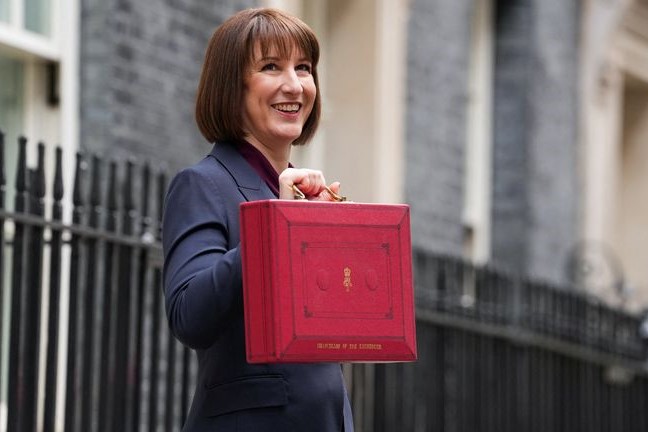Chancellor Rachel Reeves’ first Budget represents a significant shift in fiscal policy, addressing the UK’s considerable funding gap with £40 billion in new tax rises alongside targeted spending cuts.
As the UK’s first female Chancellor, Reeves stressed that this historic tax increase - one of the largest outside of a recession - reflected “difficult decisions” necessary to rebalance the economy and restore growth.
There will be no return to austerity, Reeves said. “But given the scale of the challenge we face in our public services” there will still be hard decisions to come."
Chancellor Rachel Reeves’ first Budget represents a significant shift in fiscal policy, addressing the UK’s considerable funding gap with £40 billion in new tax rises alongside targeted spending cuts.
As the UK’s first female Chancellor, Reeves stressed that this historic tax increase - one of the largest outside of a recession - reflected “difficult decisions” necessary to rebalance the economy and restore growth.
There will be no return to austerity, Reeves said. “But given the scale of the challenge we face in our public services” there will still be hard decisions to come."
Anthony McFarlin, corporation tax director at MHA’s motor tax team, noted that the Chancellor had outlined a bigger than expected funding gap.
“Tax increases of £40bn were announced – one of the largest non-recession tax rising Budgets. With dealers still reeling from the Court of Appeal ruling on 25 October, they were looking for some positives from today’s Budget,” he said.
Idustry has therefore welcomed new funding pledges of more than £2bn over five years to support the automotive sector, including the zero emissions vehicle (ZEV) manufacturing sector and supply chain.
The Treasury said this will provide the long-term certainty that industry need to invest in advanced, greener technologies.
Economic growth outlook
The Chancellor said the economy will grow faster than expected this and next year although will not expand as quickly as the Office of Budget Responsibility (OBR) predicted for 2026, 2027 and 2028.
Reeves said Labour's policies for the next decade will be played out against a backdrop of GDP growth of 1.1% in 2024, 2.0% in 2025, 1.8% in 2026, 1.5% in 2027, 1.5% in 2028, and 1.6% in 2029.
Those forecasts by the OBR on economic growth are significantly different from what it predicted in the Spring under the Conservative Government.
National minimum wage
Reeves had already confirmed that minimum wages will rise in April, with rates for over-21s set to go up to £12.21 an hour - an increase of 6.7% from £11.44 an from next April.
Earlier this year the Low Pay Commission, external recommended that the National Living Wage should increase by 5.8% to £12.10, but the chancellor has gone slightly further.
In addition, the National Minimum Wage will rise for people aged between 18-20 from £8.60 to £10.
“Given the number of jobs with base salaries at the minimum wage thresholds,” tax expert McFarlin noted, “this will significantly impact motor dealers. Minimum wage non-compliance is already a known issue to HMRC, so employers will need to keep a close eye on employees working beyond their contracted hours.”
Apprentices will get the biggest pay increase with hourly pay increasing from £6.40 to £7.55.
NFDA chief Sue Robinson said she was pleased to see an increase in apprentice wages, calling it a meaningful boost that underscored the importance of apprenticeships as a viable pathway into skilled employment.
"This increase not only provides vital financial support to apprentices but also enhances the appeal of apprenticeship programmes at a time when attracting young talent is crucial for industry growth and sustainability.”
The Government has also committed to further education funding by an additional £300 million as well as increase the Employment Allowance – to £10,500 – for the smallest employers.
Fuel duty
Reeves said higher taxes at the petrol pumps next year would be the wrong choice for working people and was therefore freezing fuel duty next year and planned to maintain the existing 5p cut for another year.
If she had decided to reverse the existing 5p per litre cut and let petrol and diesel duty rise in line with inflation it would have raised £3bn.
RAC head of policy Simon Williams said: “Drivers will breathe an enormous sigh of relief after all the speculation that the 5p cut would be scrapped at the same time as pushing duty up beyond the long-term rate of 57.95p.
“It’s good to see the Government firmly recognising the importance of the car to millions of households up and down the country. Eight-in-10 drivers tell us they are dependent on their vehicles for the journeys they need to make, while 70% of commuters who live in rural areas have no other feasible alternatives to get to work beyond taking the car.
“It’s also worth remembering that even as of today 56% of the total price of a litre of petrol is already tax in the form of fuel duty, and the VAT that is charged on top.”
MHA’s McFarlin noted that fuel duty is making a proportionately lower contribution to government finances and that it is proving politically impossible to increase taxes on traditional fuels.
“She is yet to devise a way to similarly tax EV journeys. Not only do electric cars escape fuel duty but drivers who are fortunate enough to charge at home only pay 5% VAT.”
Employers’ NI contributions
Reeves announced that National Insurance (NI) contributions by employers will rise from 13.8% to 15%.
In addition, the threshold at which businesses start paying NI on a workers' earnings will be lowered from £9,100 to £5,000, raising £25bn. "I know that this is a difficult choice," Reeves adds. "I do not take this decision lightly".
Commenting, Sue Robinson, chief executive of the National Franchised Dealers Association (NFDA said: “Raising employer NICs to 15% will significantly increase the cost of running a franchised dealership, particularly at a time when businesses are already facing pressure from rising energy costs and adapting to the shift towards electric vehicles.”
MHA’s McFarlin added: “Whilst this represents a significant increase for groups, one opportunity that could arise is businesses looking at alternative methods for reducing their employer NIC spend.
“One method of which is EV salary sacrifice arrangements that help push the transition to electric vehicles. This is further incentivised by a commitment that the company car tax percentage will remain at 5% from 2028 for EVs and a bigger differential in Vehicle Excise Duty (VED) between EVs and other vehicles from April 2025.”
Elliott Perks, CEO at Logistics business Jigcar said NI for employers and minimum wage going up means suppliers such as transport providers will likely increase their rates. “This will be worst for groups that don't have pre-agreed rates at a group-level, based on forecast volume, with carefully chosen providers.
Electric vehicles
Reeves said the government wanted to support take-up of electric vehicles by maintaining existing incentives for EVs in company car tax from 2028.
It would also increase the differential between fully electric and other vehicles in the first rates of Vehicle Excise Duty (VED) beginning in April 2025. The measure is forecast to raise about £400m by the end of the forecast period.
However, in a move which will significantly impact drivers of plug-in hybrids, the appropriate percentage rates for vehicles which produce 1g to 50g CO2 per kilometre and are also capable of operating on electric power within a certain range will be amended.
- Zero-emission vehicles: The first-year VED rate for new zero-emission vehicles will remain low at £10.
- Hybrid vehicles: Vehicles emitting 1-50 g of CO2 per km will pay a first-year rate of £110, while those emitting 51-75 g/km will pay £130.
- Petrol and diesel (ICE) vehicles: Cars emitting more than 76 g/km will see their VED rates double in 2025-26, making traditional fuel-powered cars significantly more costly in terms of road tax
The government is also considering raising the VED “Expensive Car Supplement” threshold for zero-emission cars, which could help make higher-end electric models more accessible.
There was also mention in the Budget of an intention to phase out new internal combustion engines cars by 2030. The government stated that they are “committed to phasing out new cars that rely solely on internal combustion engines by 2030 and that from 2035 all new cars and vans sold in the UK will be zero emission”.
John Cassidy, managing director of sales at Close Brothers Motor Finance, applauded the move by the Government to maintain existing incentives for EVs in company car tax from 2028 and also increase the differential in duty between fully electric and other vehicles.
"The desired effect of the measure will not only be to stimulate demand for new BEVs, but also to boost demand for used EVs and support the residual values of electric cars, which have fallen by 60% in the last 22 months in the UK.
"Importantly, the Government has pledged to match this tax break with a like-for-like investment in electric charging infrastructure across the country, which at present is failing to meet requirements.”
NFDA said it welcomed the Government’s recognition of the importance of electric vehicles in this year’s Autumn Budget.
"It is crucial that, with the ZEV mandate target set to rise to 28% next year and lagging private demand, there is continued investment in EV infrastructure to help drive adoption across the sector," NFDA chief executive Sue Robinson.
Ian Plummer, commercial director of online automotive platform Auto Trader, said: “Maintaining existing incentives and introducing preferential VED rates for electric cars will have a substantial impact on the electric transition - but given the scale of the challenge, there's still more we all need to do to help boost consumer confidence in making the switch."
Company car ownership
The Chancellor announced the maintenance of existing incentives for EVs in company car tax schemes from 2028.
In addition, although not announced by the Chancellor in the Budget statement, MHA's McFarlin said detail published within the Budget confirms that from 6 April 2026 HMRC will be “closing loopholes in employee car ownership schemes to prevent them from being used to circumvent company car tax”.
“Although there is not significant detail on how this is going to be implemented, it suggests that from April 2026 Employee Car Ownership Schemes (ECOS) will no longer work as they currently do.
“As ECOS is a scheme used by a significant number of dealers across the country, this will have a significant impact, with dealers needing to consider what approach they choose to take going forward with providing vehicles to employees. Again, EV salary sacrifice schemes could be the solution.”
Double cab pick-up vehicle
Following a Court of Appeal judgement, the government has proposed in the notes to the Budget to treat double cab pick-up vehicles (DCPU) with a payload of one tonne or more as cars for certain tax purposes.
From 1 April 2025 for corporation tax, and 6 April 2025 for income tax, the proposals mean that DCPUs will be treated as cars for the purposes of capital allowances, benefits in kind, and some deductions from business profits.
The existing capital allowances treatment will apply to those who purchase DCPUs before April 2025. Transitional benefit in kind arrangements will apply for employers that have purchased, leased, or ordered a DCPU before 6 April 2025. They will be able to use the previous treatment, until the earlier of disposal, lease expiry, or 5 April 2029.
Corporation tax and essential reliefs
Corporation tax was maintained at 25%, complete with the valuable capital allowance reliefs such as full expensing and Annual Investment Allowances, which work to give dealerships immediate tax relief on qualifying capital spend.
“This will be welcomed by dealerships who have committed to refurbishment or investment in new qualifying plant and machinery, “ said McFarlin.
CGT rate increases
He added that the CGT rate increases will however potentially have an adverse effect on owners considering an exit.
However, no changes were announced on Employee Ownership Trusts (EOTs) so these may continue to represent an attractive exit opportunity, as the 0% CGT payable on exit becomes even more beneficial to an exiting shareholder.
IHT changes
A lot of business owners would have considered their succession planning routes in previous years although given the removal of various Inheritance Tax reliefs in the Budget, business owners will need to consider whether their succession plan still represents a viable route,
McFarlin noted here: “The very significant restriction in the availability of Business Property Relief means shareholders will need to reconsider their IHT planning.”
Connectivity
"The past government made a number of promises on transport, but it failed to fund them," the Chancellor said, announcing a £500 million increase for road maintenance to tackle the backlog of potholes, aiming to repair an additional one million annually.
Key projects, including the Trans-Pennine rail upgrade and the delivery of East-West Rail between Oxford and Cambridge, are also set to advance, with promises for full electrification between Manchester and Stalybridge by year-end.
Conclusion
NFDA chief Sue Robinson said: “There were certainly a few bright spots in this Autumn Budget, particularly regarding the extension of the fuel duty freeze as well as the recognition of the importance of electric vehicles. Nevertheless, there are still key challenges which will need to be addressed."
Philip Nothard, insight director, Cox Automotive, commenting, said: “Today’s budget brought with it both positive updates and challenges for the UK automotive market.
"Retaining the current fuel duty is good news for the everyday driver, however, the same cannot be said for automotive businesses across the country.
"The raft of changes to national insurance, business rates, capital gains and minimum wage will have a significant impact on the ecosystem, which is already under continual financial pressure.”
Read NFDA Budget Briefing
Login to continue reading
Or register with AM-online to keep up to date with the latest UK automotive retail industry news and insight.




















Login to comment
Comments
No comments have been made yet.